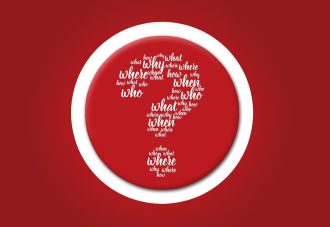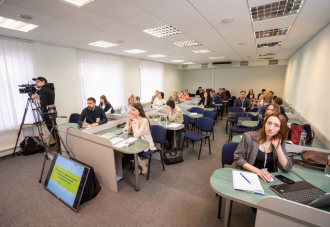“Everyone has their own unique way, everyone faces their unique challenges. Every mentoring path is a life. The lives of two organizations that have agreed to go along this path together.”
Olena Matviichuk, coordinator of the Mentoring Program, which is held for the third time by the Centre for Democracy and Rule of Law (CEDEM), mentioned this at a panel discussion during the 10th Civil Society Development Forum.
Of course, is it possible to compare the stories of DESTIGMA Support Center for Persons with Mental Disorders NGO, which worked on the adoption of the local Mental Health Program for the residents of Mykolaiv Territorial Community, and OCHEVYDNO NGO, which ensures the provision of quality funeral services in the community?
These organizations differ not only in topics. They use different tools in their work, they have different advocacy plans, different approaches.
But what DESTIGMA and OCHEVYDNO, as well as other alumni of Mentoring Programs 1.0 and 2.0 have in common is that they have received significant support from mentors, which has helped them move forward and grow.
Olena Matviichuk, the Program Coordinator, spoke in detail about how special the Mentoring Program 3.0 will be and what the organizers expect from the mentors and mentees.
Mentoring program 3.0 launches new capacities
According to the organizers, the official start of the Mentoring Program 3.0 is expected in February. But work with the mentees is already underway. Invitations to study have already been received by 46 organizations that have passed the registration selection.
“We experimented with Mentoring 2.0, thanks to the first program: received feedback and realized that the mentors spent a lot of time to make mentee understand what they want to do, what topics they want to develop. We postponed this part (which is almost two months of activity) to the period before the official start,” says Olena Matviichuk.
Organizations operating for less than 3 years were selected to participate in Programs 1.0 and 2.0. The mentors shared their advocacy experience. It worked: as the “yearbooks” of the first and second Programs show, the organizations not only achieved significant results, but also continued to move forward.
However, according to Ms. Olena, there is a demand in the public sector for other opportunities: communication, fundraising, etc. Therefore, this year the organizers have expanded the list of capabilities. In particular, the Mentoring Program 3.0 will include the below in addition to the advocacy component:
- Development of the organization’s ability to consistently raise funds from various sources for the sustainable implementation of the mission and to achieve the goals of the organization;
- Development and application by the organization of approaches and practices that ensure non-discriminatory treatment of men and women and that women and men receive equal benefits/assistance;
- Application of best international practices, development and implementation of approaches and measures to ensure the inclusion (engagement, involvement) of persons with disabilities, internally displaced persons, participants in military conflict, youth, the elderly, LGBTQI+ representatives, national minorities and other vulnerable groups .
“We anticipate that in Mentoring 3.0 the capabilities will still be connected to each other,” adds Olena Matviichuk. “We can introduce certain standards and policies in the organization, but they should be a reflection of what we do outside.”
Who are they – program 3.0 mentors?
In total, the organizers received 21 applications from the organizations that applied for the role of mentors.
According to Olena Matviichuk, 6 of them have already participated in previous programs. They include ZMINA Human Rights Center, the Legal Hundred NGO, the Light of Hope NGO, and “100% Life Network” Charity Organization, Lviv, ZURC NGO, Coalition Reanimation Package of Reforms.
The 13 mentors currently selected include 7 new mentoring organizations.
Despite the fact that some organizations are participating in the Mentoring Program for the first time, their representatives are different. After all, mentors also learn, which, of course, affects the overall development of the organization.
“The program has a structure, established rules, a minimum set of coordinator-mentor, coordinator-mentee, mentor-mentee communication standards,” says Ms. Olena. “And for me it is important that the standards that were developed by previous mentors take root in this program. So that they are not imposed.”
“We want to create the most comfortable conditions and space so that previous mentors can exchange information with new mentors. On the other hand, there should be support and less time should be spent on reinventing the wheel which is practically available.”
Mentee + mentors = honesty
46 organizations received invitations from the organizers to the training sessions which will take place on January 11 and 18. However, it is still unknown how many of them will get to know the mentors.
Olena Matviichuk explains: “I really want organizations to understand what they are being given. That it is not just studying, but an opportunity to live a part of your life by implementing an initiative that is important for yourself and the community. And to live this time together with those who have already gone through it, who know what it involves.”
According to its coordinator, as well as alumni, participation in the Mentoring Program is both a challenge and a great opportunity for the organization.
“There are organizations that said at the beginning that they would not be able to pull it off,” Ms. Olena shared her experience of previous Programs. “There is an organization that has ceased to exist. There is an organization that thought it was about project management, but you really need to work here, have a higher goal, so they didn’t go any further. And there are organizations that have implemented the idea, done everything, understood why they are in the public sector – and people split up, created their own separate NGOs and are now successfully cooperating.”
In addition, for successful collaboration with mentors, it is important that mentees understand that there might have been completely different organizations in their place that might be better positioned to take advantage of these opportunities. That is, they should appreciate the contribution of their mentors.
“Mentors devote their time, pass on their knowledge, their experience. And I’m always in favor of valuing time,” explains the Program Coordinator. “If we are involving mentors and telling them that they will choose an organization, a theme that they will be ready to support, then my personal goal is that the time and the knowledge that mentors pass on to the mentee live on. So that it’s not just a one-time event, you make an advocacy plan and that’s it.”
For mentors in this process, the readiness of the mentee to work, to communicate, responsibility in the planned steps is important: “I always wonder what mentors could do with the time they spent with the mentee. For example, they could be saving the world in some other way. They could hold trainings, write an article. There is always a choice. When we talk about dedicated time, we always have to talk about how it will work next.”
“Very often when mentees fail to do something mentors start thinking ‘something’s wrong with me’. This can significantly affect self-esteem. That is, such programs are very delicate in the format of communication and motivation,” says Olena Matviichuk.
And adds: “Stories work well when there are two factors: honesty discussed expectations and honesty in communication. It’s about the process for me.”
The material was prepared by Kseniia Ditchuk
Mentoring Program 3.0 to strengthen the advocacy and other capacities of civil society organizations from different parts of Ukraine is part of the Project Ukraine Civil Society Sectoral Support Activity implemented by the Initiative Center to Support Social Action “Ednannia” in partnership with the Ukrainian Center for Independent Political Research (UCIPR) and Centre for Democracy and Rule of Law (CEDEM) with the sincere support of the American people through United States Agency for International Development.



